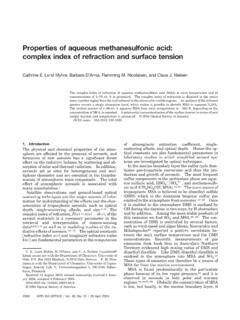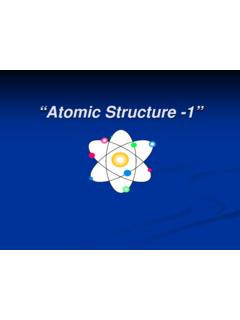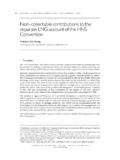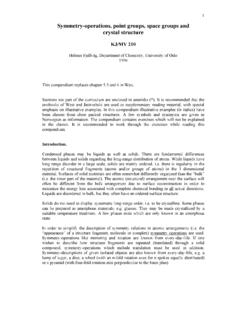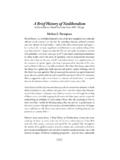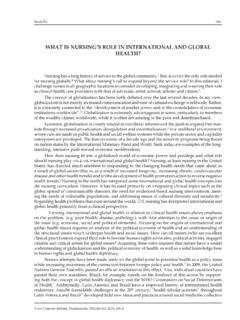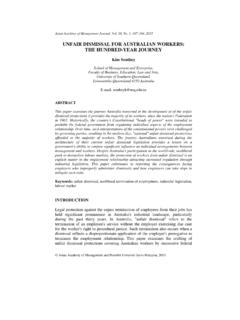Transcription of What is Neo-Liberalism
1 What is neoliberalism ? Dag Einar Thorsen and Amund Lie Department of Political Science University of Oslo Abstract: The concept of neoliberalism has, during the past twenty years or so, become quite widespread in some political and academic debates. Several authors have even suggested that neoliberalism is the dominant ideology shaping our world today , and that we live in an age of neoliberalism . The overshadowing importance accorded by some to the phenomenon of neoliberalism does not signify, however, that it is a clearly defined concept. We suggest in this article that while the concept itself has become an imprecise exhortation in much of the literature, often describing any tendency deemed to be undesirable, it might still be given a more precise definition, which we attempt below.
2 If this is done, then the concept could become a useful analytical device in order to describe some recent economic and political trends, even if it is an ever so slight overstatement to say that we live in a neoliberal age or a neoliberal society. Table of contents: INTRODUCTION .. 2 liberalism .. 3 neoliberalism : CONCEPTUAL history AND DEFINITIONS .. 7 DO WE LIVE IN THE AGE OF neoliberalism ? .. 16 BIBLIOGRAPHY .. 17 2 Introduction The subject of this article is the concept of neoliberalism and its history . The concept has, during the past twenty years or so, become somewhat of an exhortation in many political and academic debates. This has especially been the case among authors who uses the concept pejoratively, describing what they perceive of as the lamentable spread of global capitalism and consumerism, as well as the equally deplorable demolition of the proactive welfare state (cf.)
3 Especially Bourdieu 1998; 1998a; 2001; Chomsky 1999; Touraine 2001; Hermansen 2005; Saad-Filho and Johnston 2005; Hagen 2006; Plehwe et al. 2006). The concept suggests its own definition: neoliberalism is a revival of liberalism . This definition suggests that liberalism , as a political ideology, has been absent from political discussions and policy-making for a period of time, only to emerge in more recent times in a reincarnated form. It suggests, in other words, that liberalism has undergone a process of initial growth, intermediary decline, and finally a recent rejuvenation. Alternatively, neoliberalism might be perceived of as a distinct ideology, descending from, but not identical to liberalism proper . Under this interpretation, neoliberalism would share some historical roots and some of the basic vocabulary with liberalism in general.
4 This interpretation places neoliberalism in the same category as American neoconservatism , which is an ideology or political persuasion somewhat similar to and yet markedly different from much conventional conservative thought, and often hardly recognisable as a genuinely conservative ideology (Kristol 1983; Wolfson 2004, Fukuyama 2006). An initial mystery facing anyone who wants to study neoliberal ideology in more detail is that there does not seem to be anyone who has written about neoliberalism from a sympathetic or even neutral point of view. Practically everyone who writes about neoliberalism does so as part of a critique of neoliberal ideology. neoliberalism is in this critical literature customarily thought of as the return and spread of one specific aspect of the liberal tradition, namely economic liberalism .
5 Economic liberalism is, basically, the belief that states ought to abstain from intervening in the economy, and instead leave as much as possible up to individuals participating in free and self-regulating markets. Economic liberalism and neoliberalism should, in our view, be held separate from liberalism in general, which we understand, along with the Oxford English Dictionary (1989), rather broadly as a political ideology which is [f]avourable to constitutional changes and legal or administrative reforms tending in the direction of freedom or democracy . The same dictionary describes neoliberalism also, which is said to be a modified or revived form of 3 traditional liberalism , [especially] one based on belief in free market capitalism and the rights of the individual (Oxford English Dictionary 1989a).
6 While these definitions are somewhat illuminating, they do need further elaboration, which we intend to give below. In the second part of this article, we set out because we find it necessary to do so before we discuss what neoliberalism is to briefly analyse the concept of liberalism . This analysis of liberalism in general will serve as a background to the third part, which will attempt to sort out the concept of neoliberalism . At the end of this section, we will propose a unified definition of the concept we set out to describe. The fourth and final part will ask how important neoliberalism actually is, and to what degree it is the kind of governing force in the world today, as many of the critical authors would have it. This section will contain more questions than clear answers, and with it we intend to inspire others to take part in more careful reflection and further research.
7 liberalism The concept of neoliberalism suggests a particular account of the development of liberal thought. It suggests that liberalism was at one point in time an influential political ideology, but that it at some point lost some of its significance, only to revive itself in more recent times in a new form. As it turns out, however, liberalism has dominated normative political thought as well as practical politics in the West for the past sixty years, up to the point in which it has become a shared inheritance among political theorists, professional politicians, and nearly all significant political movements in its native countries. This is attested by the fact that hardly anyone speaks out against freedom or democracy anymore, which are the primary values of liberalism , as identified in the dictionary definition quoted above.
8 neoliberalism could therefore scarcely be understood as the recovery of a lost tradition of liberal, political thought. It should, in our view, instead be seen as an ideology different from, and often opposed to, what is more commonly described as liberalism . The word liberal took on a specifically political meaning with the establishment of liberal parliamentary caucuses in Sweden and Spain, and later on throughout Europe, in the first decades of the nineteenth century (Gray 1995). When these embryonic political parties coined the term liberal , they wanted to signal their favourable assessment of the emerging democratic systems in Britain and especially the United States, as opposed to their conservative opponents, who wanted to return to pre-revolutionary forms of government (cf.)
9 Sartori 1987:367f). The epithet is usually, however, held to describe a considerably older phenomenon, dating at least back to the political theories of John Locke, and his 4 philosophical and theological defence of popular sovereignty and religious toleration at the end of the seventeenth century (Laski [1936] 1997; Ryan 1993; Gray 1995). Partly because of its relatively long history , the term liberalism has become a rather nebulous concept, and usage has tended vary quite considerably over time, and in accordance with varying regional experiences. The opening sentences of one entry in a reference book should suffice to describe the lexicographer s headache: Anyone trying to give a brief account of liberalism is immediately faced with an embarrassing question: are we dealing with liberalism or liberalisms?
10 It is easy to list famous liberals; it is harder to say what they have in common. John Locke, Adam Smith, Montesquieu, Thomas Jefferson, John Stuart Mill, Lord Acton, T. H. Green, John Dewey and contemporaries such as Isaiah Berlin and John Rawls are certainly liberals but they do not agree about the boundaries of toleration, the legitimacy of the welfare state, and the virtues of democracy, to take three rather central political issues (Ryan 1993:291). The matter is not helped, either, by the fact that many have used liberalism as a generic term of praise or obloquy in the political struggle , with many liberals themselves attempting to define liberalism in such a way that only the very deluded or the very wicked could fail to be liberals (Ryan 1993:292).
